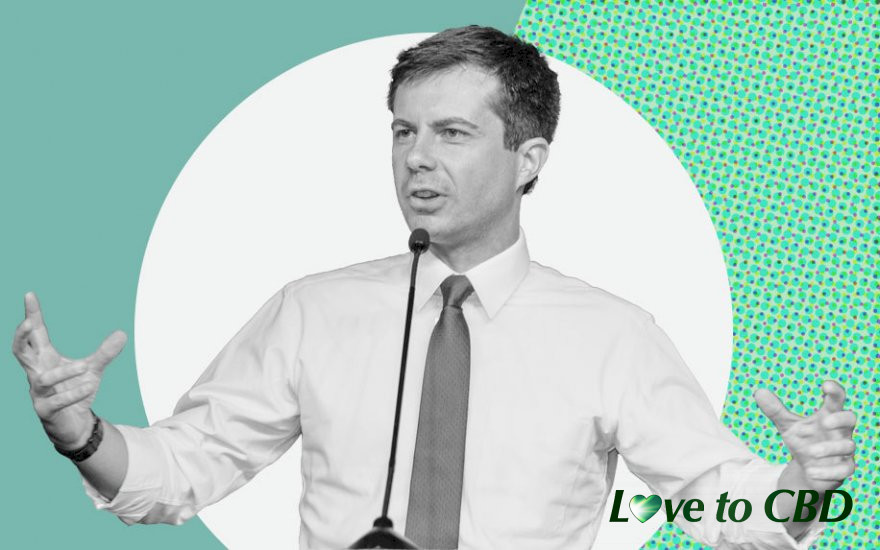Election 2020: Where Pete Buttigieg Stands on Cannabis

Earlier this year at SXSW, presidential candidate Pete Buttigieg was asked about racial justice in the U.S. He responded by telling a story about the time he got caught smoking cannabis.
A fumbled handoff led to a Harvard police officer catching him in the vicinity of a still-smoldering joint. When Buttigieg said it wasn’t his, the officer yelled at him and searched his pockets, but that was the end of the consequences he suffered.
“That was it,” Buttigieg said. “It’s a funny story I can tell about my college days.”
As the years passed, the story began to take on a different meaning to Buttigieg. “A lot of people probably had the exact same experience, and would not have been believed, and would have been a lot worse than yelled at, and would not have slept in their own beds that night — and maybe would have been derailed in their college career because of it,” he said.
Though cannabis reform hasn’t constituted a central part of Buttigieg’s 2020 platform, racial justice has. Like many of the candidates vying for the Democratic nomination, Buttigieg sees an inextricable link between cannabis reform and criminal justice — with the disproportionate enforcement in communities of color assuming a place of prominence in the discussion.
Enter the “Douglass Plan,” Buttigieg’s most complete statement on cannabis reform to date. Named after the reformer and abolitionist Frederick Douglass, the plan contains many elements of the progressive cannabis agendas that have been espoused by other 2020 candidates. The Douglass Plan would legalize cannabis, eliminate simple drug possession charges, reduce sentences for other drug charges and apply these new standards retroactively, expunge the conviction records of those who’ve already served their sentences, and make investments into communities impacted by the War on Drugs.
In a speech at the Rainbow PUSH Coalition Convention in July, Buttigieg said that the drug policy proposals are part of a plan to “achieve a 50 percent reduction in incarceration in this country without an increase in crime.”
The plan pulls no punches in its assessment of the current criminal justice system’s flaws: “We cannot incarcerate ourselves out of this public health problem.”
And as Buttigieg explained on the radio program The Breakfast Club, ending racial disparities in drug enforcement requires thinking about both the future and the past. “We know the War on Drugs is important, right?” he said. “What are we going to do about — if we decide that it actually doesn’t make sense to incarcerate for unbelievably long amounts of time for non-violent drug offenses, what are we going to do for the people we already did that to?”
Is Buttigieg Serious About Cannabis Reform?
Critics say that Buttigieg’s Douglass Plan is partly a response to his unpopularity among black voters at the national level.
On a more local scale, the plan’s release was preceded by the police shooting of a black man in June 2019, which ignited racial tensions in South Bend, Indiana, where Buttigieg serves as mayor. During an emergency town hall meeting, the Los Angeles Times reported a sense of tension in the room, with the largely black audience frequently interrupting and shouting over Buttigieg. “We don’t trust you!” was one of the sentiments that made it to print.
As one of the youngest candidates, one who only recently entered the national spotlight, the 37-year-old Buttigieg doesn’t have much of a track record around cannabis. The one notable exception is 2017 ordinance he approved as mayor of South Bend, which prohibited city businesses from selling synthetic cannabinoids.
A gay, Christian, combat veteran, Buttigieg does have experience in bridging the gap between right and left — at least in theory. And he sees cannabis reform as having a central place in this negotiation, helping to give him a moderate appeal.
In discussing bridge issues with the Indianapolis Monthly in the aftermath of the 2018 midterm elections, he said, “To find common cause between the younger, Libertarian right that’s not so sure about the Republican party as an institution … and a more traditional, progressive coalition, I think you can get there on drugs. I think you can get there on a lot of things related to criminal justice.”








